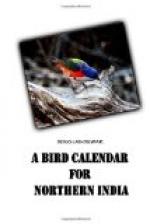NOVEMBER
It is the very carnival of nature,
The loveliest season that the year can
show!
* * * * *
The gently sighing breezes, as they blow,
Have more than vernal softness....
BERNARD
BARTON.
The climate of Northern India is one of extremes. Six months ago European residents were seeking in vain suitable epithets of disapprobation to apply to the weather; to-day they are trying to discover appropriate words to describe the charm of November. It is indeed strange that no poet has yet sung the praises of the perfect climate of the present month.
The cold weather of Northern India is not like any of the English seasons. Expressed in terms of the British climate it is a dry summer, warmest at the beginning and the end, in which the birds have forgotten to nest.
The delights of the Indian winter are enhanced for the Englishman by the knowledge that, while he lives beneath a cloudless sky and enjoys genial sunshine, his fellow-men in England dwell under leaden clouds and endure days of fog, and mist, and rain, and sleet, and snow. In England the fields are bare and the trees devoid of leaves; in India the countryside wears a summer aspect.
The sowings of the spring cereals are complete by the fifteenth of November; those of the tobacco, poppy and potato continue throughout the month. By the beginning of December most of the fields are covered by an emerald carpet.
The picking of the cotton begins in the latter part of October, with the result that November is a month of hard toil for the ponies that have to carry the heavy loads of cotton from the fields into the larger towns. By the middle of the month all the san has been cut and the water-nuts have been gathered in. Then the pressing of the sugar-cane begins in earnest. The little presses that for eight months have been idle are once again brought into use, and, from mid-November until the end of January, the patient village oxen work them, tramping in circles almost without interruption throughout the short hours of daylight.
The custard-apples are ripening; the cork trees are white with pendent jasmine-like flowers, and the loquat trees—the happy hunting ground of flocks of blithe little white-eyes—put forth their inconspicuous but strongly scented blossoms. Gay chrysanthemums are the most conspicuous feature of the garden. The shesham and the silk-cotton trees are fast losing their leaves, but all the other trees are covered with foliage.
The birds revel, like man, in the perfect conditions afforded by the Indian winter; indeed, the fowls of the air are affected by climate to a greater extent than man is.
Those that winter in England suffer considerable hardship and privation, while those that spend the cold weather in India enjoy life to the uttermost.




